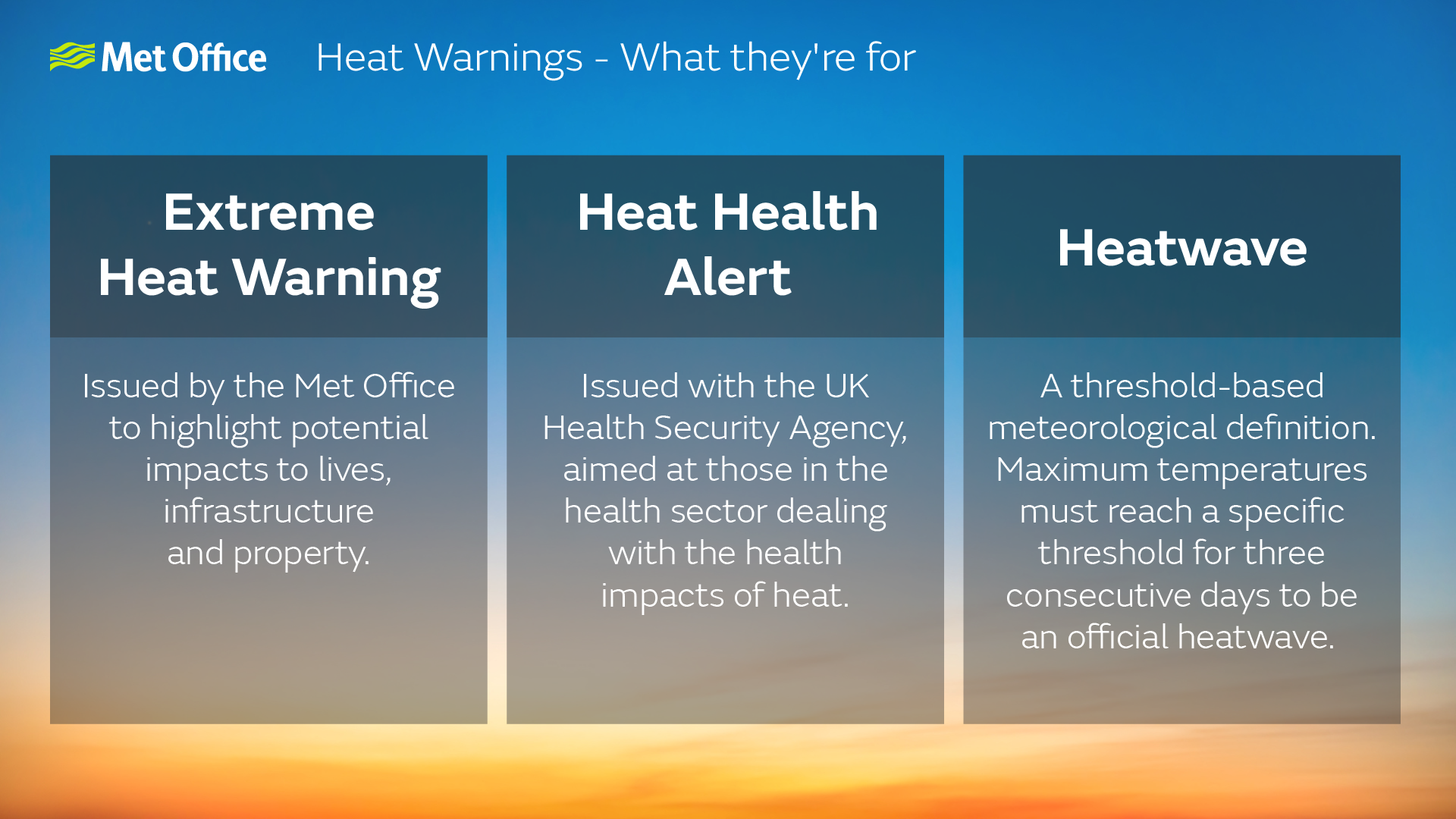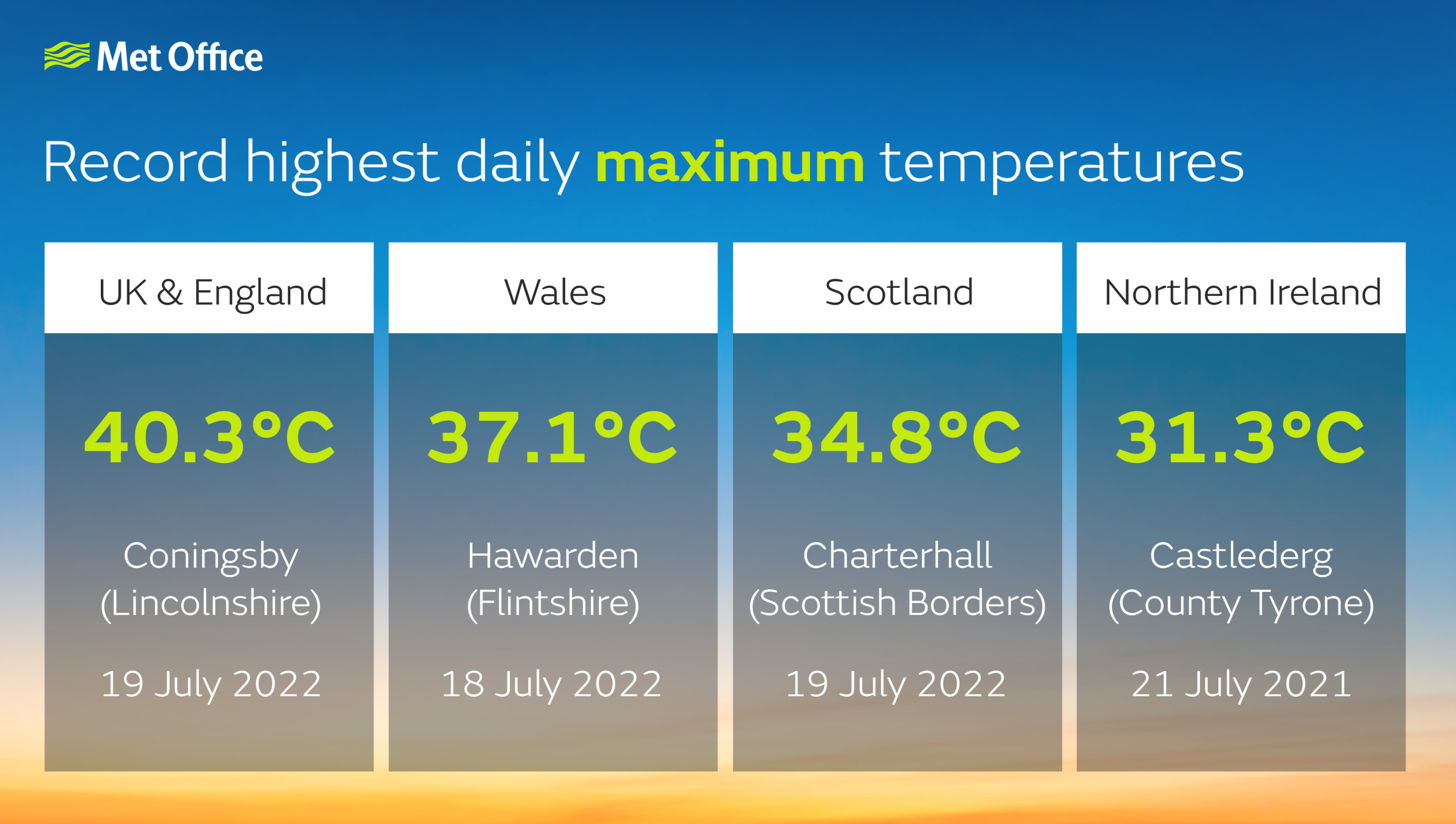Summer resources for journalists
A useful selection of resources for journalists covering summer weather in the UK.
Summer is the warmest season in the UK and on average, July is the warmest month while the rainfall totals throughout the UK in summer can be rather variable.
Use this page as a base for producing informed summer weather forecast news stories.
UK summer weather useful links
- Journalists can access and quote from the latest forecast on our UK weather page. This includes short, medium and long-range weather forecasts.
- Written forecasts for UK regions are also available from the UK weather page, by scrolling down to the ‘UK regions’ section.
- View the latest UK weather warnings on the Met Office website. Click on a warning and click on ‘further details’ for additional context which can be useful for journalists.
- Storms can also be named in the summer months. The Met Office names storms with Met Éireann and KNMI. The UK Storm Centre provides details on the storm season so far, as well as links to previous storm naming seasons.
Summer weather warnings and alerts

- As the UK’s official weather service, the Met Office is responsible for issuing weather warnings, which warn of impacts caused by severe weather. View our guide to weather warnings, how they work and what we warn for.
- Extreme heat warnings can be issued by the Met Office. This is an impact-based warning which is designed to highlight the potential impacts of extreme heat to lives, infrastructure and property.
- The UK Health Security Agency issues Heat-health Alerts which cover England. These are specifically designed for the health and social care sector when hot weather could affect people’s health.
- The Environment Agency, Natural Resources Wales, NI Direct and the Scottish Environment Protection Agency are responsible for monitoring flood risk. They monitor rainfall, river levels and sea conditions to understand flood risk beyond the usual weather forecast. Find out more about flood warnings from the partner agencies on our flood warnings guide page.
What is a heatwave?
A heatwave is an extended period of hot weather relative to the expected conditions of the area at that time of year, which may be accompanied by high humidity. Find out more about how we define a heatwave. This is a threshold-based definition used for clarity of communication.
Summer weather facts

- Meteorological summer runs from 1 June to 31 August and is the definition used by the Met Office. Other organisations may refer to astronomical summer.
- The highest temperatures in summer tend to be seen around London and the southeast, with the coolest temperatures experienced throughout Scotland and Northern England. Summers naturally have much variability, so this changes day-to-day.
- The UK in summer can experience blocking anticyclones which can bring long spells of warm weather and create heatwave conditions.
- The summer heatwave of 2022 was unprecedented and marked a milestone in UK climate history with 40°C being recorded for the first time in the UK and new national records set in Wales, Scotland and England.
Summer weather advice
Working with our partners we have produced information and advice to help people prepare for the summer weather. These pages can be used by journalists looking for advice around summer weather. Find more advice as part of WeatherReady.
Heat
- 4 tips for staying safe in extreme heat
- Tips for keeping cool in hot weather
- Hot weather and its impacts
Thunderstorms
- 5 tips for staying safe in a thunderstorm
- Stay safe in thunder and lightning
- What to do in a power cut
UV
Pollen
Summer weather and climate change
- The frequency and intensity of heatwaves have increased worldwide. A number of major heatwaves in the UK have occurred in the past 5 years (2018, 2019, 2021 and 2022), each seeing new temperatures records set.
- The headline findings from UK Climate Projections (UKCP) indicate that on average, summers will become hotter.
- Met Office UKCP Local projections indicate that hot spells will become more frequent in a future climate, particularly over the south-east of the UK. Temperatures are projected to rise in all seasons, but the heat would be most intense in summer.
Sign up for weather updates from the Met Office
- Never miss a press release from the Met Office by signing up to email alerts. You can also use this link to sign up for email alerts when weather warnings are issued.
- A free daily syndication email is available from the Met Office, including animated, presented and static content for use in the media. Email [email protected] to request access.
- Weather forecasts are available on Met Office YouTube. This includes some forecasts exclusive to that channel, including 10 Day Trend and Deep Dive, which takes a more in-depth look at the meteorological drivers behind our weather patterns.
- Follow the Met Office on X (formerly Twitter) for updates during live weather events, as well as warning and advice information.





